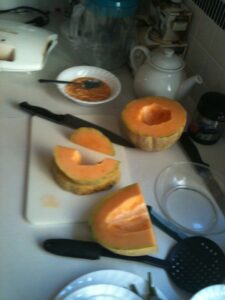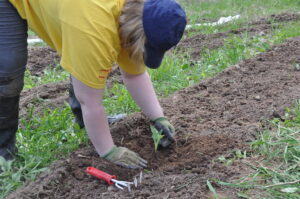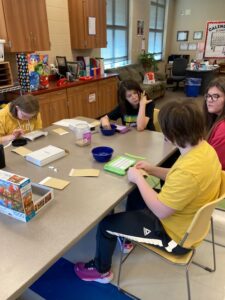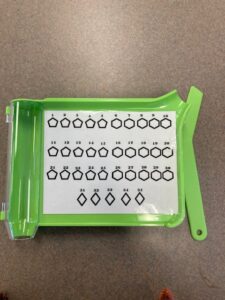Final report for FNC22-1349
Project Information
Farmer's Market vegetables and seed packages
Monopolies dominate the global supply of food and seeds. A majority of seeds are imported. Imported produce and seeds are not adapted for the Midwest. Beginning farmers struggle with access to land, mentorship, and educational systems. This detrimental divide further increases if they are special needs farmers. We All Grow will show how viable locally and sustainably sourced vegetable seed production can be, while supporting underserved beginner farmers.
Growing non-GMO heirloom vegetables and seeds plays a critical role in maintaining our local economy. The selling of vegetables and seeds provides an income and more stable supply chain. By farming, raising, and packaging open pollinated heirloom local seeds the varieties of heirloom will not go extinct. No one owns the rights to heirloom seeds. The seeds grown in the Midwest are more adapted to local growing conditions including resistance to regional pests, soil structure, and other environmental situations.
"Growing seeds on small acreage is profitable and we have seen a spike in sales as Covid hit. I sell the produce to chefs and take out the seeds to sell, so it's a double value," Zac Paige North Circle Seed, a mentor and owner of a seed company startup.
- Ecologically Sound
- Identify and collect vegetable seeds that grow well in the Midwest.
- Establish a pollinator habitat.
- Start bee production and honey gathering.
- Economically Viable
- Identify and grow chef preferred vegetables.
- Identify bestselling seeds.
- Identify seed/s with the best profit margin.
- Socially Responsible
- Identify and document adaptive tools utilized.
- Identify best practices for training and working with special needs farmers.
- Organize a public field day.
- Report and share best practices for farming with special needs, Midwest seed viability, and popularity of vegetables with area chefs.
Cooperators
- - Technical Advisor (Researcher)
- (Educator)
- - Technical Advisor (Educator)
- - Technical Advisor (Researcher)
- - Technical Advisor (Researcher)
- (Researcher)
Research
To date, we consider the project to be successful with our lessons learned. We are excited about the new year's possibilities that we can bring to so many, be it the individual in the project or the consumer enjoying their love of gardening with our hand-packed seeds. Thank you so much for this opportunity and the gift you have given so many with your project. At the end of the day, we all just want the happiness of a job well done and the self-accomplishment that this project achieved with the bonus of healthy fresh produce. We look forward to sharing our final progress report with you and the many lives we have touched.
1/14/24
Did the project meet its goals? Yes, and then some? Will the program continue after this year? Yes, for many years to come. Can others do the same in their areas?
What is next? We have made this into a webpage for growers and seed buyers and will soon make YouTube clips to demo most of these items. Mostly, we will keep the program going!
During the seed-packing process, the children were employed during the winter months. We decided not to label the packets with an individual's initials because we didn't want any young adults feeling slighted if they entered a store and only their packages were unsold. We plan to review this in the next couple of months as the young adults are packing seeds for next spring's sales.
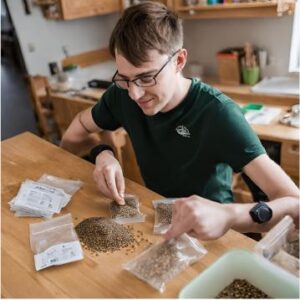 Last year, the product was given away or used for seeds. This year, we will be producing more products with more young adult farmers and selling the produce at farmers' markets along with last year's hand-packaged seeds. This year, we will continue to sell online and expand our online locations with increasing social media awareness. Social media was not fully utilized due to the program's popularity and selling all the available seed packages. We will also be selling the seed packets in brick-and-mortar locations this year. We also discovered through tests and trials that our best brick-and-mortar locations were boutique shops specializing in unique and local items. We also learned that locally owned coffee shops are good locations for our specially packed seeds. We found it best to avoid going with the mainstream locations or big box stores to sell our products. One of the other discoveries we realized was that some adults could not count to 30 plus. Counting the seeds helps them develop some of their needed life skills. The challenge came with letting the young adults count the seeds in a way that would ensure the number of seeds in a packet. After much trial and error, we discovered that by laminating a card with the numbers 1 through 32 on a pill box that was used for pharmaceutical use, the individuals could easily count out and fill the seed packets. The seed packets generally note 30 seeds per packet. We had the young adults pack 32 to ensure a margin of error, whether by error filling the packets or by non-germinating seeds. For seed packets that had smaller seeds, we developed scoops that the individuals could scoop into the packets.
Last year, the product was given away or used for seeds. This year, we will be producing more products with more young adult farmers and selling the produce at farmers' markets along with last year's hand-packaged seeds. This year, we will continue to sell online and expand our online locations with increasing social media awareness. Social media was not fully utilized due to the program's popularity and selling all the available seed packages. We will also be selling the seed packets in brick-and-mortar locations this year. We also discovered through tests and trials that our best brick-and-mortar locations were boutique shops specializing in unique and local items. We also learned that locally owned coffee shops are good locations for our specially packed seeds. We found it best to avoid going with the mainstream locations or big box stores to sell our products. One of the other discoveries we realized was that some adults could not count to 30 plus. Counting the seeds helps them develop some of their needed life skills. The challenge came with letting the young adults count the seeds in a way that would ensure the number of seeds in a packet. After much trial and error, we discovered that by laminating a card with the numbers 1 through 32 on a pill box that was used for pharmaceutical use, the individuals could easily count out and fill the seed packets. The seed packets generally note 30 seeds per packet. We had the young adults pack 32 to ensure a margin of error, whether by error filling the packets or by non-germinating seeds. For seed packets that had smaller seeds, we developed scoops that the individuals could scoop into the packets.
To design the seed packets, we also invited individuals with special needs to create the packets with an heirloom feel. Again, this was done to help employ and promote somebody's work and give them self-fulfilling gratitude for a well-done task.
Our seed packets' target market is individuals looking to buy a story. This is a common practice with items that cannot be mass-produced.
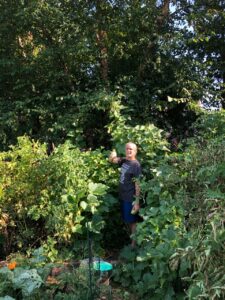 Others will find the information valuable and time-saving. Because of the NCR-SARE program's support, we tried several things that none of the members could have afforded. If the person chooses, they can make extra money selling at local farmer's markets, but most choose to share with family and friends. When you start a project like this, you think in mind of the outcome, but
Others will find the information valuable and time-saving. Because of the NCR-SARE program's support, we tried several things that none of the members could have afforded. If the person chooses, they can make extra money selling at local farmer's markets, but most choose to share with family and friends. When you start a project like this, you think in mind of the outcome, but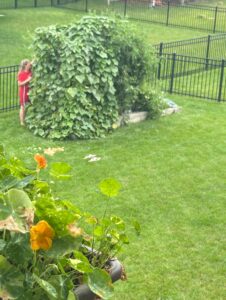 even we are amazed at the positive outcome and impact we have made with this project. Just the act of selling the seeds and the people who bought them, the joy on their faces learning about the young adults that packaged them. Getting a good product at a reasonable price with a good cause made them smile and feel good. Also, have them report back at the end of the year on how well their plants did. To the growers, seed fillers, and customers, we gave joy fulfillment with a low-cost means and added fresh produce along the way. Thank you all for supporting this project. At the end of the day, we all want the happiness of a job well done and the self-accomplishment that this project achieved with the bonus of healthy, fresh produce.
even we are amazed at the positive outcome and impact we have made with this project. Just the act of selling the seeds and the people who bought them, the joy on their faces learning about the young adults that packaged them. Getting a good product at a reasonable price with a good cause made them smile and feel good. Also, have them report back at the end of the year on how well their plants did. To the growers, seed fillers, and customers, we gave joy fulfillment with a low-cost means and added fresh produce along the way. Thank you all for supporting this project. At the end of the day, we all want the happiness of a job well done and the self-accomplishment that this project achieved with the bonus of healthy, fresh produce.
Educational & Outreach Activities
Participation Summary:
- We have connected with two other nonprofits working with young adults with special needs.
- Media coverage will begin in the spring as seed-buying season hits.
- We have a media consultant that will be setting up local tv station interviews and newspaper articles.
- We have a social media consultant that will help with getting the word out by social media that will start in the spring.
Learning Outcomes
The project has had an exciting year of outcomes and lessons learned that can be shared with the agricultural and educational community. This year we have been establishing our project by developing the proper methods and techniques in these uncharted areas. In 2023 we plan to roll it out to more young adults who enjoy agriculture that also have special needs.
Our hope for this project was that our target audience, young adults with special needs age 18 - 21, would get enjoyment and fulfillment from working in the agriculture field. This was accomplished by watching the young adults planting seeds, observing and managing the plants as they mature, watching the plants produce fruit, and then packing the seeds. Observing the young adults handing out home-grown products was the equivalent of watching a young child open a well-desired birthday present.
During the seed-packing process, the children were employed during the winter months. We decided not to label the packets with an individual's initials because we didn't want any of the young adults feeling slighted if they entered a store and only their packages were unsold. This is something we plan to review in the next couple of months as the young adults are currently packing seeds for next spring's sales.
Last year product was given away or used for seeds. This year we will be producing more products with an increased number of young adult farmers and selling the produce at farmers' markets along with last year's hand-packaged seeds.
Last year packaged seeds were sold online exclusively. This year we will continue to sell online and expand our online locations with increasing awareness of social media. Because of the limited number of seed packages last year, social media was not used. We will also be selling the seed packets in brick-and-mortar locations this year.
For the designing of the seed packets, we also used individuals with special needs to design the packet with an heirloom feel. Again, this was done to help employ and promote somebody's work and give them self-fulfilling gratitude of a task well done.
The individuals that were participating in the different farming and seed packing processes were individuals from a local 18 to 21 program. The plan is to have the program be self-sufficient and reproducible by other schools with similar programs. In the Kansas City area alone and only on the Kansas side of the city, we currently know of at least 10 of these programs. These programs are also essential in rural America, where this program, Everyone Grows was implemented. Because there are fewer businesses in rural America that offer work-study opportunities, these individuals have fewer opportunities.
In 2022 we sold over 500 packets at one online location only. This year we plan on selling over 2,000 seed packets at multiple locations and are on track to increase that each year. Plus, we will have the local farmer's market to sell the products. We also plan to increase the number of young adult farmers with special needs engaged in the program.
1/14/24
1. Lessons Learned
A. Making it simple and low-cost
The project's main objective was to provide low-cost solutions for non-profits, schools, and growers. We explored alternatives to costly items after having tested many of them. The project assists growers and schools with limited funds who wish to have a garden. We chose seeds that could be harvested repeatedly and found free mulch and low-cost plant food for the gardens.
We also considered someone's time a cost factor; we wanted to use methods that only required them to spend a little time on the tasks. With this in mind, we valued money and time early in finding methods.
**We found that so many believe that before they can grow anything, they must first spend money to get started and have more available money to continue. One of the side benefits of this project was to dispel this myth.
We tested many of our products or suggestions side by side, with the less expensive option doing better than the store-bought items.
B. Prep for planting and feeding
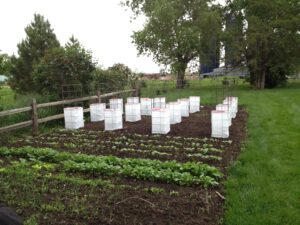 In the ideal world, you would have a garden tiller or expensive items to till your whole garden, but again, going with the lower cost options, we went with a "no-till" approach. We only replaced the dirt around the plant, about a gallon, with potting soil from the local hardware store. Doing this, we explained to the growers, "Why feed the weeds?" Only replace the soil around your plant; some felt they had to replace the entire garden with new soil. Running a tiller can be hard work and too much for some of the group members.
In the ideal world, you would have a garden tiller or expensive items to till your whole garden, but again, going with the lower cost options, we went with a "no-till" approach. We only replaced the dirt around the plant, about a gallon, with potting soil from the local hardware store. Doing this, we explained to the growers, "Why feed the weeds?" Only replace the soil around your plant; some felt they had to replace the entire garden with new soil. Running a tiller can be hard work and too much for some of the group members.
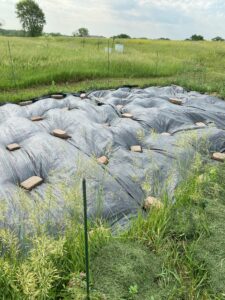 For the growers with a lot of land, we would place down a thick sheet of black plastic each year in the Spring and not pull it off until the following year. Moving it each year and having two gardens you could switch between, one for planting and one for covering with black plastic. The black plastic would prep the land for the next year; the dirt was soft, and the worms had done their job. We found this worked best, better than tilling the ground, again only putting in some new soil around the plant.
For the growers with a lot of land, we would place down a thick sheet of black plastic each year in the Spring and not pull it off until the following year. Moving it each year and having two gardens you could switch between, one for planting and one for covering with black plastic. The black plastic would prep the land for the next year; the dirt was soft, and the worms had done their job. We found this worked best, better than tilling the ground, again only putting in some new soil around the plant.
![]() For the tomatoes, we used an old pot with the bottoms removed around the critical plants for protection. The pots were held in place by two
For the tomatoes, we used an old pot with the bottoms removed around the critical plants for protection. The pots were held in place by two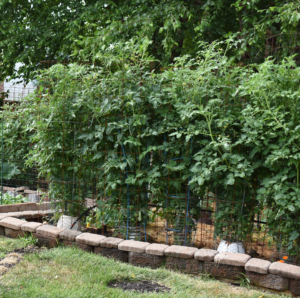 gardening stakes or just plain sticks if you had a lot of tree branches around. This would also let you put mulch or cover around the plant up to 6 inches deep without harming the plant. More details below under tomatoes.
gardening stakes or just plain sticks if you had a lot of tree branches around. This would also let you put mulch or cover around the plant up to 6 inches deep without harming the plant. More details below under tomatoes.
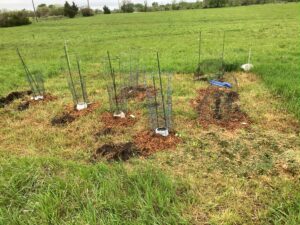 We also found that if you contact a local tree service, they will give you as many free wood chips as you want. Ensure that the wood chips do not come from a diseased tree if you have trees nearby. The wood chips can be used as mulch around the plants. Also, as long as they have not put down weed and feed fertilizer lately, anybody cutting and bagging their lawn is happy if you take their grass clipping, which can be used as mulch. Using the rain barrels, see watering; we found it best to add the plant food into the barrels after they were filled.
We also found that if you contact a local tree service, they will give you as many free wood chips as you want. Ensure that the wood chips do not come from a diseased tree if you have trees nearby. The wood chips can be used as mulch around the plants. Also, as long as they have not put down weed and feed fertilizer lately, anybody cutting and bagging their lawn is happy if you take their grass clipping, which can be used as mulch. Using the rain barrels, see watering; we found it best to add the plant food into the barrels after they were filled.
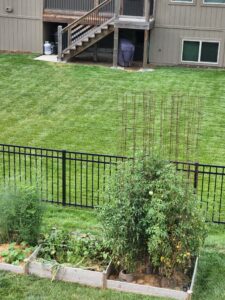 The plant food we found the best results with, while being low cost, was 2 tsp of master blend 4-18-38, 2 tsp calcium nitrate 15.5-0-0, and 1 tsp of Epsom salt per 4 gals. We found this worked best in the hydroponics system as well as in the soil. For growers with challenges measuring, we had them use dollar store plant spikes once a month.
The plant food we found the best results with, while being low cost, was 2 tsp of master blend 4-18-38, 2 tsp calcium nitrate 15.5-0-0, and 1 tsp of Epsom salt per 4 gals. We found this worked best in the hydroponics system as well as in the soil. For growers with challenges measuring, we had them use dollar store plant spikes once a month.
What we also found to be excellent weed control was straw bales. See Bees for why we tried this. It kept the weeds down for the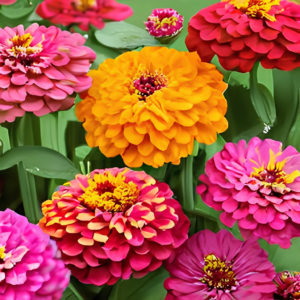 entire year if you put it down thick enough. The only problem with this was someone gave us wheat straw, that had not been harvested; it was just cut and made into straw. So for those gardens, we had all kinds of wheatgrass growing, and we had to place black plastic tarps or other mulch around the plants to kill off the wheatgrass, which was taking over the gardens.
entire year if you put it down thick enough. The only problem with this was someone gave us wheat straw, that had not been harvested; it was just cut and made into straw. So for those gardens, we had all kinds of wheatgrass growing, and we had to place black plastic tarps or other mulch around the plants to kill off the wheatgrass, which was taking over the gardens.
Note: we also used precut tarps if that was cheaper for the size we wanted vs. black plastic. It would help if you had something waterproof and thick so the weeds don't pop through it. We also found plain mulch to work during late spring; if overstocked, some Walmart stores will sell the mulch for as low as $1per bag.
C. Watering
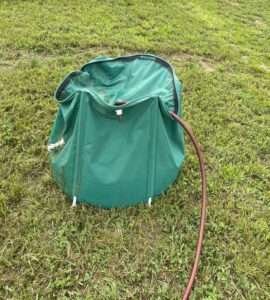 We spent a lot of time and resources finding easy and inexpensive ways to water the plants in the heat of the summer. Watering can be one of your highest costs. We tried solar water pumps, gravity pumps, and many others. The best we found was that if the garden was next to a home, use a drip system hooked to a timer and garden hose. The drip saved water and gave it to the plants that needed it, not the weeds. We found that the rain barrel worked great for areas with a creek or runoff that only contained water after rain. We also, found a great solar drip system that can pull water from a rain barrel. The solar unit pumped more water the
We spent a lot of time and resources finding easy and inexpensive ways to water the plants in the heat of the summer. Watering can be one of your highest costs. We tried solar water pumps, gravity pumps, and many others. The best we found was that if the garden was next to a home, use a drip system hooked to a timer and garden hose. The drip saved water and gave it to the plants that needed it, not the weeds. We found that the rain barrel worked great for areas with a creek or runoff that only contained water after rain. We also, found a great solar drip system that can pull water from a rain barrel. The solar unit pumped more water the 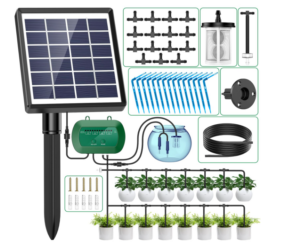 more the sun was out. In the places where the creek or runoff is, we use a 12v water pump to fill the water barrels.
more the sun was out. In the places where the creek or runoff is, we use a 12v water pump to fill the water barrels.
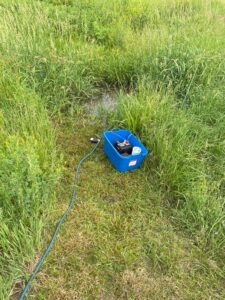 The top items that failed for us were partially burying water bottles or clay pots next to the plants and filling them. The growers couldn't tell when they need to add water to buried bottles or pots. Traditional garden sprinkler systems increased watering costs, while watering weeds.
The top items that failed for us were partially burying water bottles or clay pots next to the plants and filling them. The growers couldn't tell when they need to add water to buried bottles or pots. Traditional garden sprinkler systems increased watering costs, while watering weeds.
Also, we put timers on the gravity fed rain barrels that only watered part of the day for some locations. We found out the hard way, that most timers, designed for garden hoses, use the pressure of the water to open the value, and rain barrels do not have that same pressure, so the plants did not get watered.
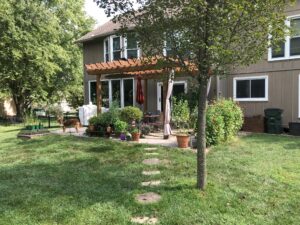 We also tried one computerized system that would turn on the hose only when water was required. It worked but not as well as the gravity fed system or the solar system described above. Those systems ran each day for 5-10 minutes in the morning and 5-10 minutes at night. Ensuring it was 2 to 3 hours after sunrise or before sunset so you would not get plant disease. At some locations, we would water for 15-30 minutes in the morning only. If the garden hose or drip lines were in the sun all day, we found that later watering would kill the plants with the water being too hot in the drip hoses system. In these cases we would put the hoses underground if possible.
We also tried one computerized system that would turn on the hose only when water was required. It worked but not as well as the gravity fed system or the solar system described above. Those systems ran each day for 5-10 minutes in the morning and 5-10 minutes at night. Ensuring it was 2 to 3 hours after sunrise or before sunset so you would not get plant disease. At some locations, we would water for 15-30 minutes in the morning only. If the garden hose or drip lines were in the sun all day, we found that later watering would kill the plants with the water being too hot in the drip hoses system. In these cases we would put the hoses underground if possible.
If you used the upside-down pot trick, the key to note is that water is inside or drips inside the pot next to the plant's stem and root system.
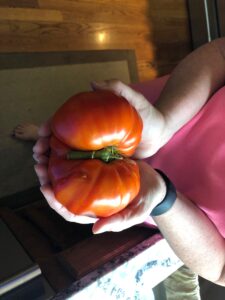 D. Tomatoes
D. Tomatoes
What we learned from tomatoes needs its own discussion. We tried many ways, but we returned to old school and the days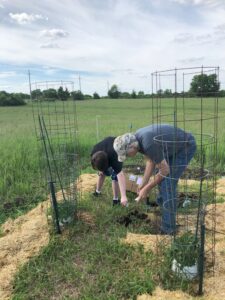 in which people used old rusty coffee cans around the young plants. Not having tin coffee cans anymore, we went with plastic pots and put them upside down, with the bottoms removed. This lets the young plants grow without the wind beating them up; they grow in strength as they pop up over the pot. Also, we learned that brown or darker pots worked great in the spring for pulling in the heat but not in the hot summer. So, white or light colors worked best for the year. Next, we held the pots down with garden stakes and used concrete construction wire as the tomato cages; this was the cheapest way we found to make many tomato cages. Also, we found that a shot of B vitamin when the plant was young did great, as did a shot of Neem oil. (see below about Neem oil) Using the plant food listed already, we found the best results to help stop tomatoes rot and other problems that hit the tomatoes.
in which people used old rusty coffee cans around the young plants. Not having tin coffee cans anymore, we went with plastic pots and put them upside down, with the bottoms removed. This lets the young plants grow without the wind beating them up; they grow in strength as they pop up over the pot. Also, we learned that brown or darker pots worked great in the spring for pulling in the heat but not in the hot summer. So, white or light colors worked best for the year. Next, we held the pots down with garden stakes and used concrete construction wire as the tomato cages; this was the cheapest way we found to make many tomato cages. Also, we found that a shot of B vitamin when the plant was young did great, as did a shot of Neem oil. (see below about Neem oil) Using the plant food listed already, we found the best results to help stop tomatoes rot and other problems that hit the tomatoes.
E. Hydroponics?
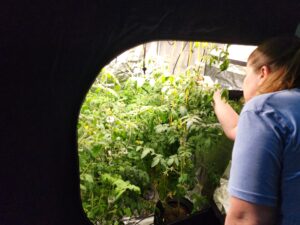 We tested different kinds of hydroponic growing systems inside and outside. Inside we used tented Hydroponics and
We tested different kinds of hydroponic growing systems inside and outside. Inside we used tented Hydroponics and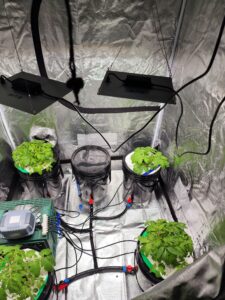 outside we used sun supported Hydroponics. We did not find this a good option for two reasons. 1. entry costs can be higher than traditional farming. 2. because the plants have direct access to the water and no soil, any errors will immediately impact the plant and kill them. Because of this, we did not find it to be a good option. What we did find as a good option was taking the cuttings from a tomato plants in the fall, rooting them and placing them in Hydroponics. Then in the Spring again taking cuttings from the plants, rooting them and placing them in starter dirt then slowly exposing them to the outdoor sun before placing them into the gardens. This ensured that the plants did not get
outside we used sun supported Hydroponics. We did not find this a good option for two reasons. 1. entry costs can be higher than traditional farming. 2. because the plants have direct access to the water and no soil, any errors will immediately impact the plant and kill them. Because of this, we did not find it to be a good option. What we did find as a good option was taking the cuttings from a tomato plants in the fall, rooting them and placing them in Hydroponics. Then in the Spring again taking cuttings from the plants, rooting them and placing them in starter dirt then slowly exposing them to the outdoor sun before placing them into the gardens. This ensured that the plants did not get 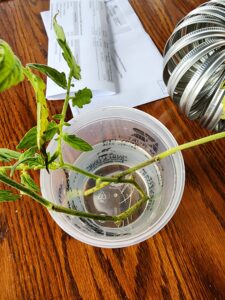 crossbred with other tomato plants. We also found a simpler hydroponics pail that can work to grow some items on a deck of a small area for one plant at a time. We also learned a crucial fact in Hydroponics: when it comes to watering, some plants can be in water 24/7, and others need a break from the water. Tomatoes like a flood and then dry. We had the system water for 5 minutes and watering off for 20 minutes.
crossbred with other tomato plants. We also found a simpler hydroponics pail that can work to grow some items on a deck of a small area for one plant at a time. We also learned a crucial fact in Hydroponics: when it comes to watering, some plants can be in water 24/7, and others need a break from the water. Tomatoes like a flood and then dry. We had the system water for 5 minutes and watering off for 20 minutes.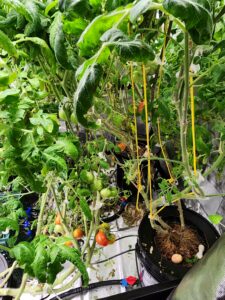 The second part is that some plants can have the grow lights on for 20 hours, and some, like tomatoes, need a minimum of 8 hours of darkness to grow and rest. One other lesson learned with Hydroponics is that when bringing in plants from the outside which are grown in dirt, they may contain unwanted bugs, even if the roots are thoroughly rinsed. This could cause outbreaks that could kill all the plants in the hydroponics system. Causing the need for a complete cleaning and resetting of the system.
The second part is that some plants can have the grow lights on for 20 hours, and some, like tomatoes, need a minimum of 8 hours of darkness to grow and rest. One other lesson learned with Hydroponics is that when bringing in plants from the outside which are grown in dirt, they may contain unwanted bugs, even if the roots are thoroughly rinsed. This could cause outbreaks that could kill all the plants in the hydroponics system. Causing the need for a complete cleaning and resetting of the system.
F. Packing the Seeds/ labeling /Selling the Seeds
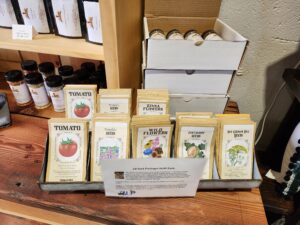 The team packaged the seeds at their own pace and ability, which gave them great joy. Some had limited ability, and
The team packaged the seeds at their own pace and ability, which gave them great joy. Some had limited ability, and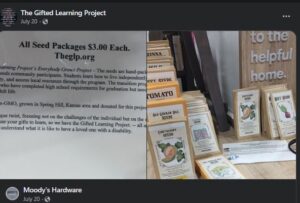 working with the group, we developed some great adapted methods to help them package the seeds. We came up with items such as using a board designed for counting and dispensing pharmaceuticals in a pharmacy which was modified to help the team count and package the seeds. Most of the items we needed for packing seeds we found on Amazon. We had professional printers price out and run some small runs for us. For about 1/4 of the cost, we could print the labels ourselves.The best part of this was that the team was timely. No food would spoil or go bad. They could take their time.
working with the group, we developed some great adapted methods to help them package the seeds. We came up with items such as using a board designed for counting and dispensing pharmaceuticals in a pharmacy which was modified to help the team count and package the seeds. Most of the items we needed for packing seeds we found on Amazon. We had professional printers price out and run some small runs for us. For about 1/4 of the cost, we could print the labels ourselves.The best part of this was that the team was timely. No food would spoil or go bad. They could take their time.
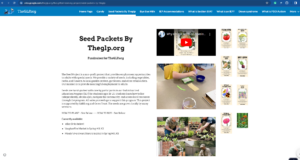 With us printing the labels ourselves for the seed packages, we found it surprising that some young adults who did not enjoy the seed packing liked putting the labels on the seed packages. And for those who wanted both, the program allowed for change daily to give the young adults something different to work on. We also did this with what type of seeds they had to package, giving them a variety of options on seed types. The giant seeds used the boards we came up with for counting , while smaller seeds used a scoop for measuring.
With us printing the labels ourselves for the seed packages, we found it surprising that some young adults who did not enjoy the seed packing liked putting the labels on the seed packages. And for those who wanted both, the program allowed for change daily to give the young adults something different to work on. We also did this with what type of seeds they had to package, giving them a variety of options on seed types. The giant seeds used the boards we came up with for counting , while smaller seeds used a scoop for measuring.
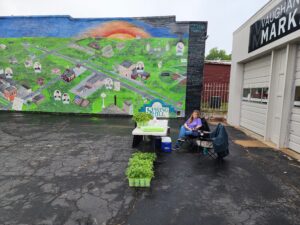 We found that the local boutique shop gave us the best results for the seed sales and growers selling plants. We did do some
We found that the local boutique shop gave us the best results for the seed sales and growers selling plants. We did do some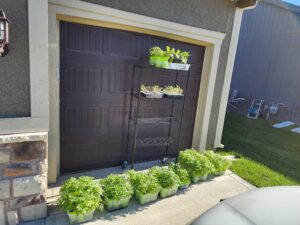 online sales but found it best to sell locally. The growers who sold extra items found it best to sell them to smaller farmer markets. We had a good return of buyers and a developed customer contact list. We also gave the seeds to community gardens to help their non-profits.
online sales but found it best to sell locally. The growers who sold extra items found it best to sell them to smaller farmer markets. We had a good return of buyers and a developed customer contact list. We also gave the seeds to community gardens to help their non-profits.
G. Long-term food storage for the team
 It was great for the team to have a fulfilling job, but how about some great home grown healthy produce? The produce is grown in the summer and unavailable to the team in winter. After much testing, canning, and other ideas to help the team have some of the harvest in the winter, we found an answer. The team could make tasty homemade tomato soup, freeze-dry it, and give it to the team members. One essential part of freeze drying was it had a higher nutritional value than canning or freezing, and two, it was easy to make for the individuals. Just add warm water to the powder to the thickness you like. Easy, fast and healthy.
It was great for the team to have a fulfilling job, but how about some great home grown healthy produce? The produce is grown in the summer and unavailable to the team in winter. After much testing, canning, and other ideas to help the team have some of the harvest in the winter, we found an answer. The team could make tasty homemade tomato soup, freeze-dry it, and give it to the team members. One essential part of freeze drying was it had a higher nutritional value than canning or freezing, and two, it was easy to make for the individuals. Just add warm water to the powder to the thickness you like. Easy, fast and healthy.
H. Participant Satisfaction?
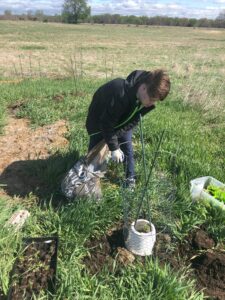 The participants did not have to pay for the program or supplies, and neither did the school.
The participants did not have to pay for the program or supplies, and neither did the school.
Our hope for this project was that our target audience, young adults with special needs, would enjoy and feel fulfilled by working in agriculture. This was accomplished by watching the young adults planting seeds, watching the plants mature and producing fruit, and then packing the seeds. Observing the young adults handing out home-grown products was the equivalent of watching a young child open a well-desired birthday present.
Hand Packaged with Care by our Participants Program - Students 18-21 on an Individualized Education Plan (IEP). The program prepares students for post-secondary opportunities, such as living independently, obtaining a job, navigating the community, and accessing local resources. 100% of the sales support this program.
As we learned, there are three ways that someone can learn. Some can learn all three ways, and some only one or two. One: Show me; two, tell me; three, I show someone else. For all the seed packing and growing items, we tried to do all three so that each person could learn how to do the tasks.
With the team packing the seeds, they were asked who wanted to package some seeds and/or label for an hour a day. Many loved it; it was their quiet time, and at the same time, it was the joy of fulfillment, something that they could show their families and friends they did. Be it by taking one home or seeing it for sale in the local stores. The group that grew the product for seed also had that same pride. The extra items they produced could be sold at local farmer's markets. Some sold the plants at spring events.
In teaching the adults with special needs or volunteer veterans that grow for us, we would explain it, show them, and ask them to teach it back to us. This was the best for learning. We also let them express any ideas. No matter if they had one plant in a pot or hundreds of plants. We found these main things with new growers: they don't know the basics of growing something or they had been told wrong; they don't want to fail or have the plant die on them; or some just loved the plant to death.... by giving it too much of something. After helping them with this, the joy of growing the first tomato or flower, or whatever they planted, was one of their joys of the year and then some. Some even added to their joy by selling their produce or plants that they had grown at the local farmers market.
2. Lessons Learned
A. Bees
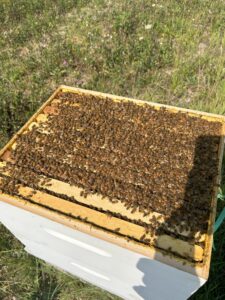 We learned this was the most challenging part of the project; the young adults with special needs wanted nothing to do with the "bugs ." The varoa mite problem has invaded our country and was outside our ability to find a lower-cost solution to having bees. Bees are expensive and need a lot of care. We found it best to plant flowers and other plants that attracted all kinds of pollinators and came up with a seed package just for that. If someone wanted to get into bees cheaply, trapping swarming bees would be the best we found. But just as when you get your first pet, you will learn that they have a lot of needs to keep them healthy in today's world.
We learned this was the most challenging part of the project; the young adults with special needs wanted nothing to do with the "bugs ." The varoa mite problem has invaded our country and was outside our ability to find a lower-cost solution to having bees. Bees are expensive and need a lot of care. We found it best to plant flowers and other plants that attracted all kinds of pollinators and came up with a seed package just for that. If someone wanted to get into bees cheaply, trapping swarming bees would be the best we found. But just as when you get your first pet, you will learn that they have a lot of needs to keep them healthy in today's world.
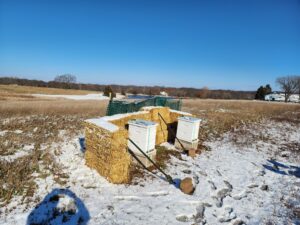 One thing that worked best for us was putting straw bales on the north side of the hive in the winter. I made a wall of straw bales to block the wind, and the straw would heat up and store some heat for the nighttime. We also put styrofoam on the top of the hives, which helped prevent the heat from getting out. Note that mice like to stay warm in the straw bales, so keep the bales about 2+ feet from the hive. Also, making sure you have a good mouse guard is necessary. We tried wrapping hives but had better luck with the straw bale wall. We tried different kinds of windbreaks, but this was the cheapest and had the best results. Before it got too hot in the spring, we removed the straw bales and spread them over the gardens as weed control.
One thing that worked best for us was putting straw bales on the north side of the hive in the winter. I made a wall of straw bales to block the wind, and the straw would heat up and store some heat for the nighttime. We also put styrofoam on the top of the hives, which helped prevent the heat from getting out. Note that mice like to stay warm in the straw bales, so keep the bales about 2+ feet from the hive. Also, making sure you have a good mouse guard is necessary. We tried wrapping hives but had better luck with the straw bale wall. We tried different kinds of windbreaks, but this was the cheapest and had the best results. Before it got too hot in the spring, we removed the straw bales and spread them over the gardens as weed control.
We will keep our bees because they gave the group some honey, and it is like only having a puppy for a day. The bees become your pets, so be mindful of that.
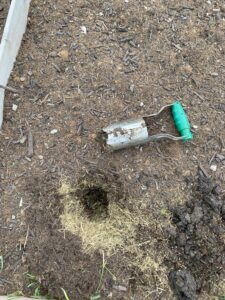
We found that for some plants planted next to each other, one would thrive, and one would die. We found that some plants initially did not get planted as deep as the plants next to them. As a solution, we used a hole digger for plants that had already started and ensured they were all the same depth when planting them. For seeds, we would dig a row or area about 5 inches down, replace three inches of soil with composed or new bagged garden soil, place the seeds down, and put two more inches of fresh soil on top of that. The untouched part is covered with mulch on both sides of the row. This is what works best.
B. Bugs / Deer / Mice
Again, after trying many different ways, this is our short list of what worked for each item.
Bugs: Feeding the plant a very watered-down Neem oil solution seems to make the plant less tasty to the bugs. And if the bugs did hit, we would spray the plants with Neem oil. The downside was if it rained hard, the Neem oil would be washed off, which is why we also liked the drip system for the plants versus sprinkler systems. Neem Oil did not work for Japanese Beetles.
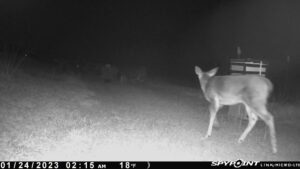 Deer: Most of our plants had some cages around them, even the flowers; we put half cages over them. But this did not stop the deer from eating what was out of the cages. So we used an old trick and placed Original Irish Spring bar soap on the cages. Cut bars into four equal parts and put them on the cages. This helped keep deer away. Refresh about once a month... and make sure if it rains a lot, the soap runoff does not fall too close to the plant's stems. We did try fences with luck, but sad to say, the cost was high, and we would not recommend them to the group because of the cost.
Deer: Most of our plants had some cages around them, even the flowers; we put half cages over them. But this did not stop the deer from eating what was out of the cages. So we used an old trick and placed Original Irish Spring bar soap on the cages. Cut bars into four equal parts and put them on the cages. This helped keep deer away. Refresh about once a month... and make sure if it rains a lot, the soap runoff does not fall too close to the plant's stems. We did try fences with luck, but sad to say, the cost was high, and we would not recommend them to the group because of the cost.
Mice: The biggest problem we had with mice was chewing through items, trying to get to the water in the water barriers or other items used for watering. In the fall, we need to ensure that all water barriers and hoses have all the water drained from them and stored in a place that would not let the mice in. We also found that they don't like wood chips used as mulch around the plants. Grass clippings worked great for mulch but were enjoyed by mice for nesting in.
Project Outcomes
The progress report for "Everybody Grows" Project.
The 18 to 21 program is a program developed by high schools to help individuals with special needs that are not quite ready to be introduced to the world and need just a little bit of extra time and skills. As you might have guessed, this group has graduated high school but is not yet 21 years old. This project helps these individuals develop extra counting skills by using visualizing steps in multisensory, which was an extra benefit to the project. It also helps individuals find a new love of gardening that they can use throughout their adult life. One of the other benefits that have been realized by this program, which was not expected, was the fulfillment of the individuals helping the young adults. The helpers also found agricultural passions and enjoyment by watching the individual's excitement over a job well done, be it fulfilling seed packets or watching the products grow from the ground. It truly lived up to its name Everyone Grows, be it the participants or the staff, or the end consumer feeling good about the products they get while helping support a worthwhile project.
To date, we consider the project successful with our lessons learned. We are excited about the new year's possibilities that we can bring to so many, be it the individual in the project or the consumer enjoying their love of gardening with our hand-packed seeds. Thank you so much for this opportunity and the gift you gave so many with your project. At the end of the day, we all want the happiness of a job well done and the self-accomplishment that this project achieved with the bonus of healthy, fresh products. We look forward to sharing our final progress report with you and the many lives we have touched.
One of the biggest successes has been customer satisfaction with the seeds. Feeling good about the cause and outcome of the seeds.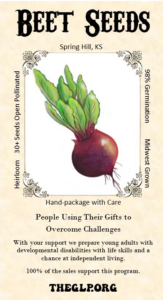
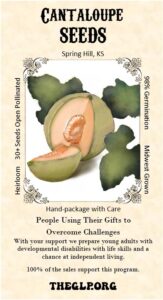
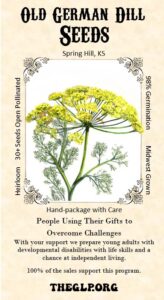
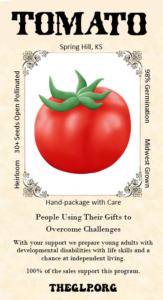


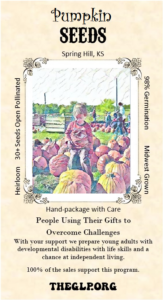
We discovered through tests and trials that our best brick-and-mortar locations were Boutique shops that specialize in unique and local items for seed sales. We also learned that locally-owned coffee shops are a good location for our specialty packed seeds. We found it best to avoid going with the mainstream locations or big box stores to sell our products.
We discovered our seed packets' target market is individuals looking to buy a story. This is a common practice with items that cannot be mass-produced.
One of the other discoveries we realized was that some of the adults were not quite able to count to 30 plus. And counting the seeds helps them develop some of their needed life skills. The challenge came with being able to let the young adults count the seeds in a way that would ensure the number of seeds in a packet. After many trials and errors, we discovered that by laminating a card with the numbers 1 through 32 on a pill box that was used for pharmaceutical use, the individuals could easily count out and fill the seeds packets. The seed packets generally note 30 seeds per packet. We had the young adults pack 32 to ensure a margin of error, whether by error filling the packets or by non-germinating seeds. For seed packets that had smaller seeds, we developed scoops that the individuals could scoop into the packets.
The beauty of this project was the discovery that massive amounts of land are not required to produce the seeds necessary for the packaging and product sale. This project could be reproduced in other locations by local farmers or individuals, allowing the groups to use small amounts of land.
The area that was challenging for us and we would probably not recommend to anyone copying or reproducing this project would be the bees. Instead, we might recommend that the group work with an existing beekeeping person that practices good habits. Or locate the gardens near existing bee hive colonies. The challenge we came across was the consistent fight of the bee mites. We found that individuals with special needs weren't really fond of suiting up and taking care of the bees. So in that way, it was a big learning lesson for the project.
